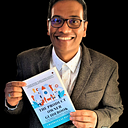How I became extrovert from introvert in the last two decades
“There is no such thing as a pure introvert or extrovert. Such a person would be in the lunatic asylum.”- Carl Jung.
Why this topic?
There are numerous types of team members. Which category are you into? And how about your team members? Do you recognize the strength and weaknesses of their skills? How can you leverage the strength of yours and others by knowing their strength and weakness?
An introvert is generally considered to be a quiet, reserved, and thoughtful human being.
People who are introvert tend to be inward-directed, or focused more on internal thoughts, feelings, and moods rather than seeking out external stimulation.
According to Eysenck’s theory, introverts are those that have naturally high levels of arousal. Because introverts tend to experience chronically high arousal levels, they tend to seek activities and environments where they can escape from over-stimulation. Because of their naturally high arousal levels, they are more alert and take in more information from the environment. Escaping somewhere to have time alone to recharge gives them the opportunity to process and reflect on what they have learned.
Psychologist Carl Jung was the first person to describe these two personality extremes back in the 1960s.
He wrote that introverts, and extroverts could be separated based on how they regain energy. (The term “extrovert” is now used more commonly than “extrovert.”) Introverts, his basic definition said, prefer minimally stimulating environments, and they need time alone to recharge. Extroverts refuel by being with others.
Till at the end of college, I was an Introvert person. I always avoided social congregation and I chose to work alone. I had very few friends, but all of my friends had a very deep friendship with me.
Once I got the job and gradually advanced in the corporate world, I started realizing the benefits of Introversion and I also thought about getting into the extrovert world. Initially in my career when I was in my transition period, my Introvert personality helped me in my professional career.
Now after 20 years of my corporate career, when I look back, I have changed a lot in my nature. I now like all this stuff which I used to avoid earlier.
Some of the general characteristics associated with extroversion include:
· Varied and deep interests
· Likes to communicate by talking
· Enjoys being the center of attention
· Tends to act first before thinking
· Enjoys group work
· Feels isolated by too much time spent alone
· Looks to others and outside sources for ideas and inspiration
· Likes to talk about thoughts and feelings.
In western society, extroversion is celebrated. The outgoing and enthusiastic nature of a person who gets things done and is a great communicator is considered an asset.
Researchers at the University of Chicago, and Harvard and Stanford Universities found that introverted chief executives make better leaders.
Both styles are positive, and negative based on the context.
Extroversion is more common than introversion. If we understand and develop both in balance, it will be beneficial, and we can channelize ourselves based on the need.
At least I can switch on and off based on the demand.
It takes a polished Introvert personality to compose a book! And it takes a polished extrovert personality to promote the book!
“You are not what you think; you are not what you say; you are what you do.”- Peter Dunne, The 50 Things
